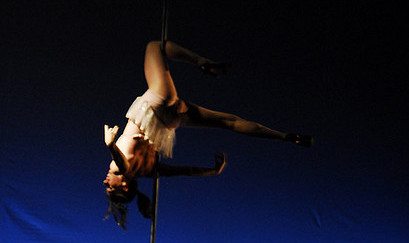Warwick Pole spins circles in Berlin
A Warwick Pole Society member has been promoting the sport of pole-dancing in Berlin, Germany during her studies abroad at the Free University of Berlin (FU).
Berenice ‘Be’ Cowan, a student studying English at FU, has been helping to popularise ‘pole’ in Berlin where the movement is just beginning to take off as a form of exercise and art.
Ms Cowan started pole-dancing at Warwick University after taking part in dance and gymnastics. She now trains for six to eight hours per week in Berlin dance studios.
Megan Roberts, president of Warwick Pole Society, was happy to see the activity promoted positively: “Warwick Pole has always been quick to dispel the stereotypical images associated with the phrase ‘pole-dancer’, so the fact that Ms Cowan is now representing that view internationally is something we wholly support.
Ms Cowan found that there were not many pole dancing clubs at German Universities during her FU studies.
“No universities have pole societies here, people are always really shocked when I say I learnt and then taught at my university – I think they get confused and think I literally study pole-dancing at university sometimes!
Ms Roberts commented on the recent success of Warwick Pole Society: “Last term we ran a series of lessons for all-male sports clubs – Are You Man Enough? – to show the male demographic that ‘pole’ takes a huge amount of strength and agility.
“We’re hoping to increase the number of teams involved when we run it for a second time this term.”
Ms Roberts summarised the sport to the Boar: Warwick Pole [Society] has always promoted ‘pole’ as a way to put the fun back into fitness.
“As soon as someone tries it, they realise that actually, supporting your own body weight for the duration of a four minute routine is no mean-feat, it’s just as physically demanding as any other form of exercise.”
Ania Przeplasko, board member of the International Pole Dance Fitness Association (IPDFA), described the sport as “a mixture of weightlifting, jogging and dance”.
Ly Li, dancer and founder of a Berlin pole studio, commented on the stereotypes associated with the sport: “In the US and Australia [pole-dancing] is more advanced, more accepted, and the girls doing it are more open with the sexual side.
“[In Europe, girls] are more shy, and to be more accepted it has to be promoted as a sport.”
The IPDFA hosted its fifth annual International Pole Championship in Singapore in November 2013 finishing with a men’s event.
The association has also been campaigning for the sport to be introduced as a trial event at the Olympic Games.
Ms Roberts commented: “There were rumours that we would see Olympic pole dancers in Rio [2016], but I think there’s still a little way to go before then.
“However, four years on in 2020 I wouldn’t be at all surprised to see these sports athletes compete on the world stage – just like all the others.”

Comments